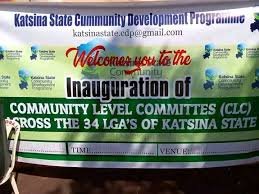When Good Governance Looks Like Rebellion: Satire, Governor Radda, and the APC’s Deafening Silence

@Ahmed Abdulkadir
A few days ago, I shared a cleverly written satirical article by an anonymous friend titled “Governor Radda’s Anti-Party Government: When APC Wasn’t Looking!” The write-up, dripping with irony, seemed to amuse many — but it also left a few readers puzzled. Some couldn’t quite tell whether the piece was praising Governor Dikko Radda or mocking him. Others were unsure who exactly was being criticized.
This blog post is a gentle clarification — and an opportunity to explain the meaning of satire, while also reflecting on the curious case of a governor who is doing everything right, yet appears to be doing it alone. If that’s not worth thinking about, what is?
First, What Exactly Is Satire?
Satire is a form of writing or commentary that uses humor, irony, and exaggeration to expose folly, incompetence, or hypocrisy. It doesn’t throw punches openly. Instead, it smiles, winks, and uses clever language to challenge the status quo. Think of it as telling the truth in a way that makes people laugh — and then think.
So, when the article sarcastically described Governor Radda’s good governance as “anti-party behavior,” it wasn’t insulting the governor. It was, in fact, praising him — while mocking the political party he represents: the All Progressives Congress (APC) in Katsina State.
Who Is Really Being Criticized?
Contrary to what some may have thought, the satire is not an attack on Governor Radda. It is a brilliant and well-aimed criticism of a party structure that seems indifferent to the success of its own governor.
Let’s be honest: Governor Radda has, in just two years, proven himself as a proactive and people-focused leader. From the declaration of a state of emergency in education, to the revitalization of primary healthcare centers, to empowering youth and women, to restoring dignity to civil service, and even addressing insecurity with a well-coordinated community-based response — Radda has been ticking boxes that many past administrations left untouched.
And yet, the APC in Katsina has been largely silent.
Where are the press conferences celebrating these achievements? Where are the rallies showing support for his reforms? Where is the media machinery of the party projecting him as a model for governance?
This silence — this vacuum — is precisely what the satire targets. It highlights the absurdity of a political party being uncomfortable with its own success story. It playfully suggests that Governor Radda must be engaging in “anti-party activities” simply because he is doing things the right way, unlike the party’s past tradition of sluggishness, neglect, and excuses.
How a Party Should Behave
In any decent political culture, when a party-sponsored candidate performs well, the party:
* Celebrates the performance as proof of its capability to lead.
* Supports and protects the governor politically.
* Amplifies his achievements to strengthen the party’s reputation.
* Uses his example to inspire other public office holders.
But the APC in Katsina appears confused. There is no real effort to own Radda’s performance. There’s no consistent messaging, no cohesive branding, no campaign to align the party’s image with the governor’s success. If anything, the silence suggests disconnect or worse, envy.
The Media Angle: A Serious Weakness
Part of the problem, perhaps, is that the party lacks competent media hands. Unlike modern political organizations that invest in media engagement, content strategy, and public relations, the APC in Katsina is still operating like it’s 2003 — waiting for radio jingles and posters during elections.
Ironically, it is Governor Radda himself who seems to understand the importance of modern media in governance and politics. He has appointed media aides not only across ministries, departments, and agencies (MDAs) but also extended this structure to local government councils. This has a twofold benefit:
1. It creates jobs for the teeming unemployed youths in the state.
2. It ensures his activities and policies are well publicized across platforms and locations.
This strategic move has helped fill the gap left by the party’s media failure. The government is doing its part — now the party needs to wake up.
That said, what remains is to adequately train these media aides to equip them with the skills needed for professional, strategic communication. With proper training, they can be transformed from mere content relayers into agenda-setters, capable of framing narratives, managing perception, and shaping public opinion in favor of the administration and its long-term goals.
In Conclusion: Satire with a Purpose
The satirical piece was never about disrespecting the party or mocking its leadership — it was a call to wake up and smell the governance. Governor Radda is not the problem. In fact, he’s the solution the APC should be proud to sell. But for some strange reason, they act like they don’t know what to do with him.
In 2023, Governor Radda rode on the back of the APC to power. In 2027, the APC may have to cling tightly to his performance record to remain relevant. One good turn, after all, deserves another — but only if the party wakes up and joins the ride.
Until then, as my friend jokingly put it, it looks like Governor Radda’s greatest political offense is that he’s actually doing his job.
And in the APC’s book, that’s apparently Anti-Party.
Abdulkadir is a veteran journalist and resides in Karsina.





